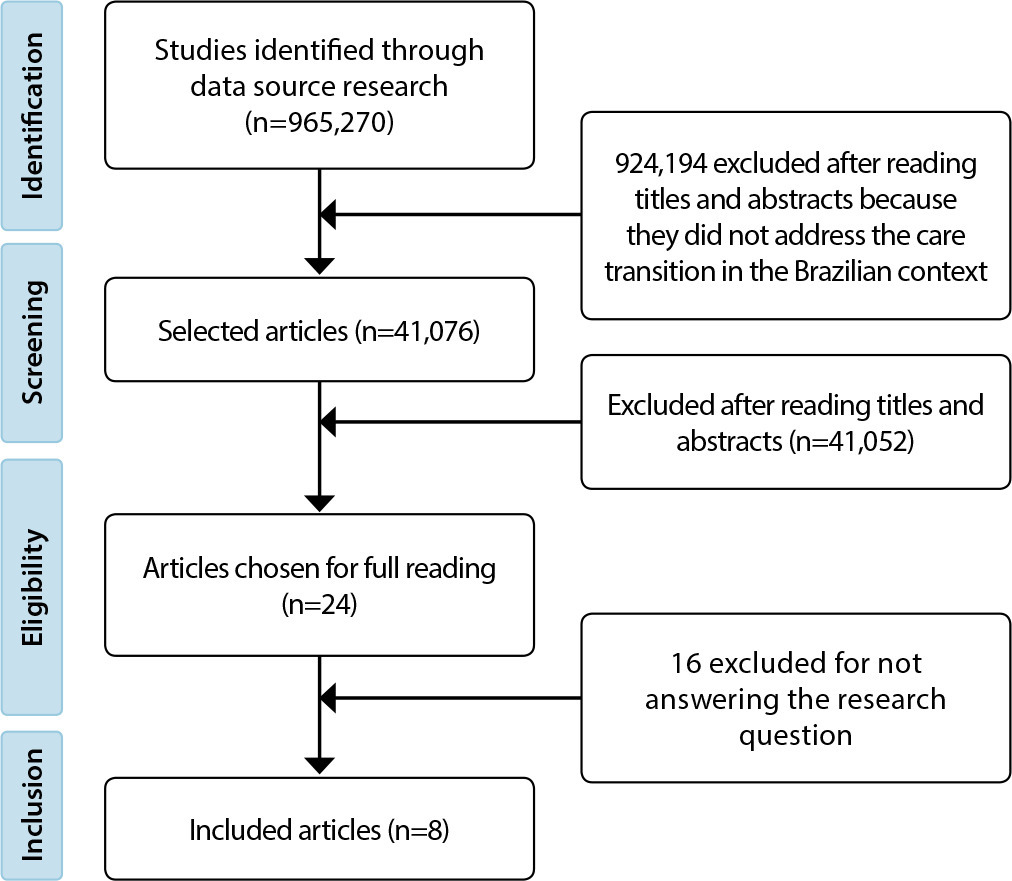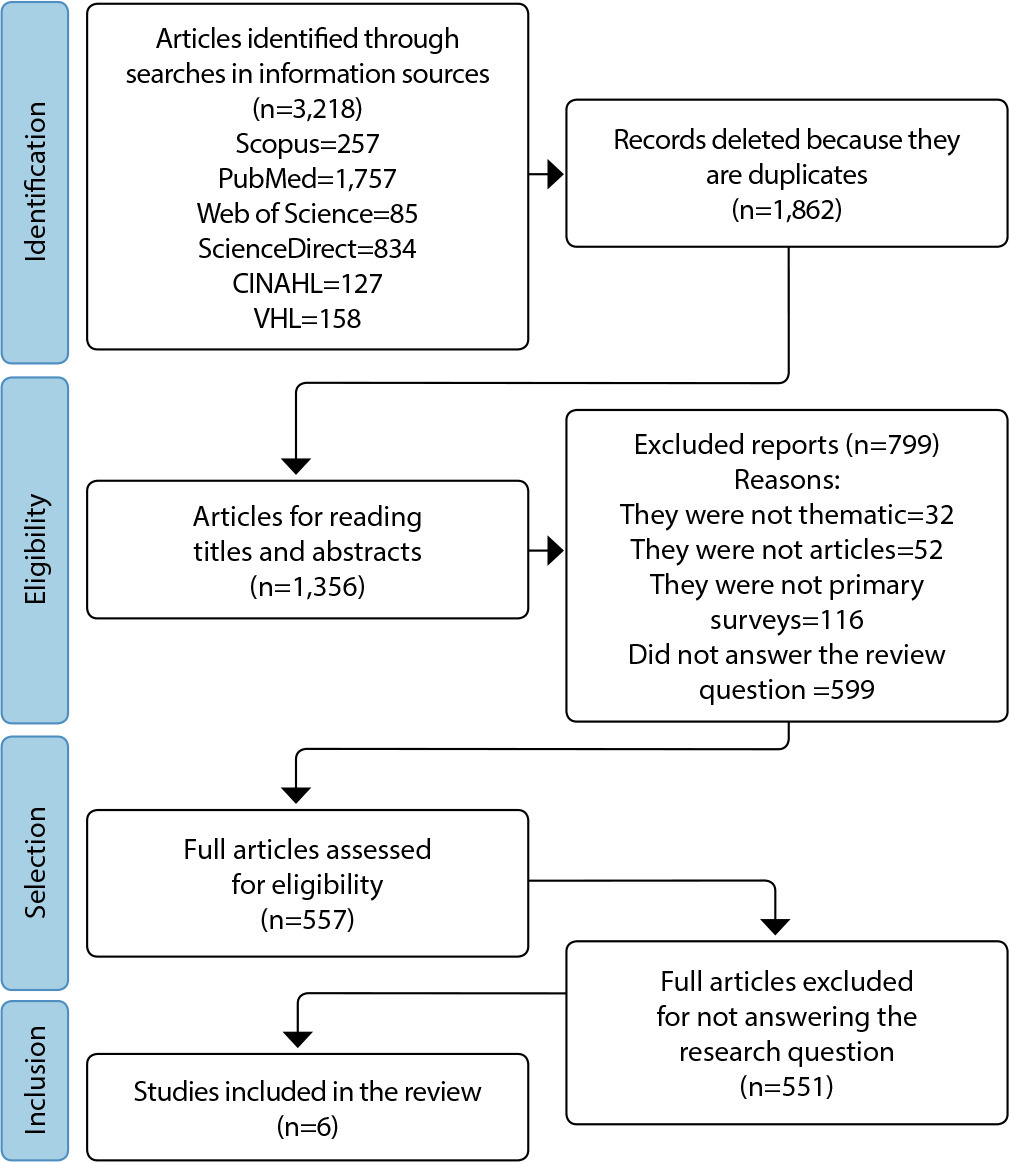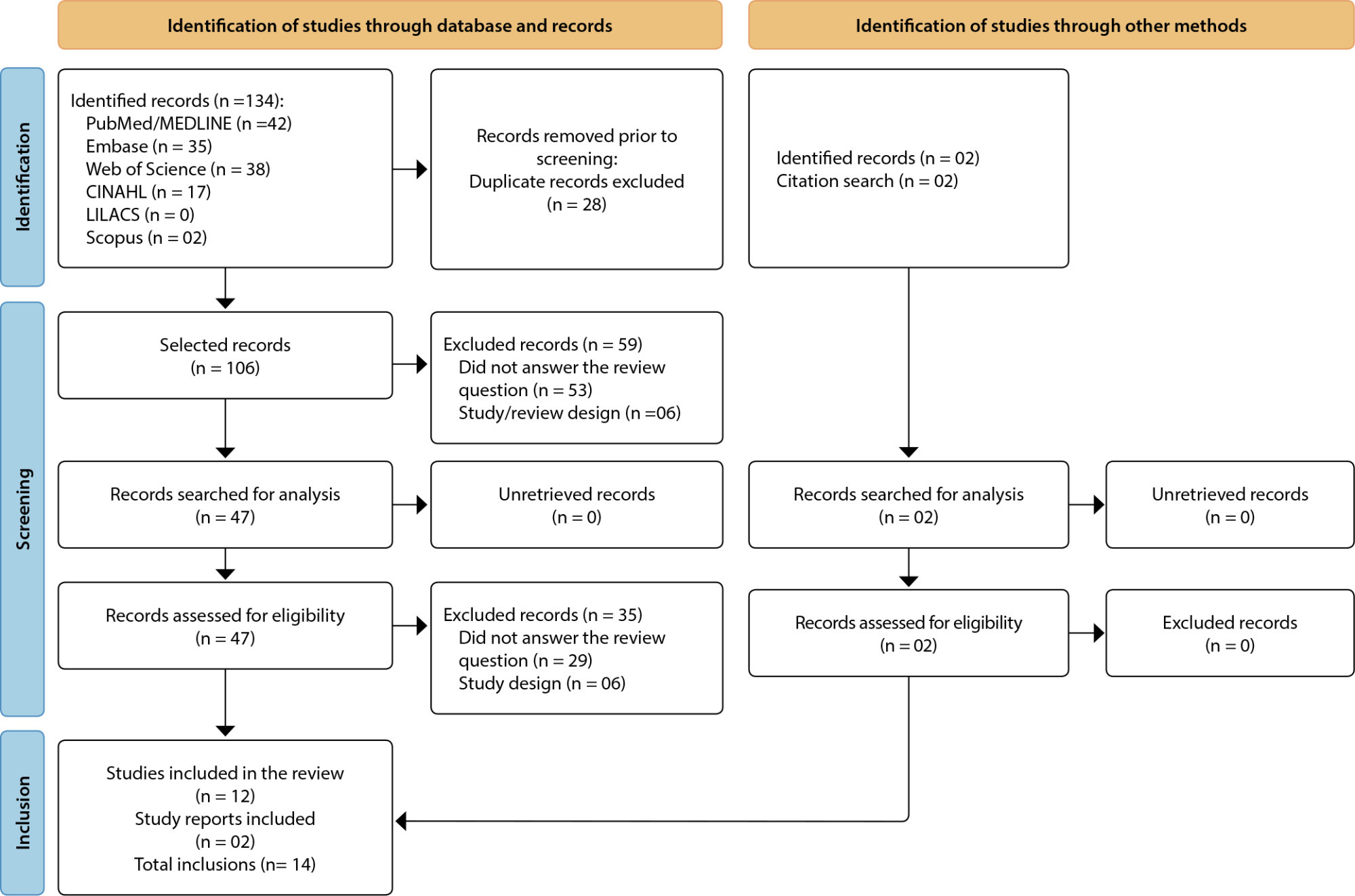-
ORIGINAL ARTICLE
Effect of cardiovascular biofeedback on nursing staff stress: a randomized controlled clinical trial
Revista Brasileira de Enfermagem. 2023;76(6):e20230069
12-04-2023
Abstract
ORIGINAL ARTICLEEffect of cardiovascular biofeedback on nursing staff stress: a randomized controlled clinical trial
Revista Brasileira de Enfermagem. 2023;76(6):e20230069
12-04-2023DOI 10.1590/0034-7167-2023-0069
Views0See moreABSTRACT
Objective:
to assess the effect of cardiovascular biofeedback on nursing staff stress when compared to an activity without self-monitoring.
Method:
a randomized controlled clinical trial, carried out with nursing professionals from a university hospital. The intervention group (n=58) performed cardiovascular biofeedback, and the control (n=57) performed an online puzzle without self-monitoring, totaling nine meetings over three weeks. The outcome was assessed using the Stress Symptoms and Work-Related Stress scales, and the biological marker heart rate variability. The generalized estimating equations method was used.
Results:
the intervention had no effect on self-reported instruments (p>0.050). However, there was an effect of time (p<0.050) on all heart rate variability indicators, demonstrating changes over the sessions.
Conclusion:
cardiovascular biofeedback showed promising results in the biological marker, suggesting that it can be used in nursing staff as a complementary therapy by promoting better autonomic nervous system regulation.

-
Transition of Care for Individuals with Mental Disorders in Brazil: A Contextual Analysis
Revista Brasileira de Enfermagem. 2023;76(6):e20230063
12-04-2023
Abstract
Transition of Care for Individuals with Mental Disorders in Brazil: A Contextual Analysis
Revista Brasileira de Enfermagem. 2023;76(6):e20230063
12-04-2023DOI 10.1590/0034-7167-2023-0063
Views0See moreABSTRACT
Objective:
To describe the contexts of care transition for individuals with mental disorders in the Brazilian setting.
Methods:
A contextual analysis was conducted through a scoping review. The search for studies was conducted in databases and thesis and dissertation portals, and the analysis was based on immediate, specific, general, and meta-contexts.
Results:
The sample, consisting of eight studies, indicated that the following factors are present in the contexts where care transition occurs: Peculiarities of care transition for individuals with mental disorders; Perspectives that can strengthen or weaken this transition; Approaches proposed in the past for the development of care transition; and Elements related to Brazilian legislation.
Final Considerations:
It is observed that the transition of care for individuals with mental disorders in Brazil takes place in various contexts of care levels. These variations present significant potentials and barriers in the care scenarios.

-
ORIGINAL ARTICLE
Sexual behavior according to undergraduate students: perspective of cross-cultural nursing and intersectional framing
Revista Brasileira de Enfermagem. 2023;76(6):e20220786
12-04-2023
Abstract
ORIGINAL ARTICLESexual behavior according to undergraduate students: perspective of cross-cultural nursing and intersectional framing
Revista Brasileira de Enfermagem. 2023;76(6):e20220786
12-04-2023DOI 10.1590/0034-7167-2022-0786
Views0ABSTRACT
Objective:
to discuss undergraduate students’ sexual behavior from the perspective of social markers and cross-cultural care proposed by Madeleine Leininger.
Methods:
descriptive-exploratory qualitative research, with a theoretical-philosophical foundation in the Transcultural Theory. Convenience sample was composed of 57 young people from two universities in Rio de Janeiro. The focus groups’ content were analyzed lexically using the IRAMUTEQ software.
Results:
four classes emerged: Young people’s sexual scripts: between the fear of an unplanned pregnancy and the risk of exposure to sexually transmitted infections; Affective relationships: trust in steady sexual partners, apparent sense of security and disuse of condoms; Sexual practices, gender and cultural determinants: distinction in men’s and women’s role; Sexual partnerships, negotiation of condom use and vulnerability to sexually transmitted infections.
Final considerations:
challenges are perceived for the attention to undergraduate students’ sexual health, who verbalized risky sexual behaviors due to sociocultural vulnerabilities.
Keywords:Cross-Cultural NursingIntersectional FramingSexual BehaviorSexually Transmitted InfectionsYoung AdultSee more
-
Sleep quality of nurses who worked in coping with COVID-19: an integrative review
Revista Brasileira de Enfermagem. 2023;76(6):e20230007
12-04-2023
Abstract
Sleep quality of nurses who worked in coping with COVID-19: an integrative review
Revista Brasileira de Enfermagem. 2023;76(6):e20230007
12-04-2023DOI 10.1590/0034-7167-2023-0007
Views0See moreABSTRACT
Objective:
to analyze sleep quality of nurses who worked coping with COVID-19 in scientific evidence.
Methods:
an integrative review, carried out in seven databases, including studies between December 2021 and June 2022, without language restrictions. The sample consisted of 15 primary studies.
Results:
nurses working in hospital, intensive care, outpatient care and teaching institutions constitute a vulnerable group for sleep disorders: latency, duration, efficiency and quality. The disorders identified involved insomnia at varying levels of severity: daytime dysfunction and morning sleepiness. Night work and low capacity for self-care were determinants of impaired sleep patterns.
Final considerations:
the COVID-19 pandemic contributed to greater vulnerability of nurses to changes in sleep, requiring strategies for risk management and well-being promotion.

-
ORIGINAL ARTICLE
Work and Mental Distress among Nurses in the Amazon Region of Brazil during the COVID-19 Pandemic
Revista Brasileira de Enfermagem. 2023;76(6):e20220792
12-04-2023
Abstract
ORIGINAL ARTICLEWork and Mental Distress among Nurses in the Amazon Region of Brazil during the COVID-19 Pandemic
Revista Brasileira de Enfermagem. 2023;76(6):e20220792
12-04-2023DOI 10.1590/0034-7167-2022-0792
Views0See moreABSTRACT
Objective:
To assess the relationship between psychopathological symptoms and the social, clinical, and occupational profile of nurses in the Amazon region of Brazil during the COVID-19 pandemic.
Methods:
A descriptive cross-sectional online study was conducted in 2020 with 261 nurses. The Symptom Assessment Scale-40 was utilized.
Results:
The presence of pre-existing conditions before the pandemic was associated with psychotism (p=0.044). Experiencing constraints and/or violence at work during the pandemic was associated with somatization (p=0.025), and working hours were associated with anxiety (p=0.025). Nurses predominantly exhibited symptoms related to fear (33.7%), tension (34.5%), and a sense that something is wrong in the mind (22.6%).
Conclusions:
A significant association was observed between working hours and anxiety symptoms, the experience of constraints and/or violence at work during the COVID-19 pandemic and somatization symptoms, as well as between pre-existing conditions and psychotism symptoms related to COVID-19.
-
Simulation training of caregivers at hospital discharge of patients with chronic diseases: an integrative review
Revista Brasileira de Enfermagem. 2023;76(6):e20230043
12-04-2023
Abstract
Simulation training of caregivers at hospital discharge of patients with chronic diseases: an integrative review
Revista Brasileira de Enfermagem. 2023;76(6):e20230043
12-04-2023DOI 10.1590/0034-7167-2023-0043
Views0See moreABSTRACT
Objective:
to identify evidence about the use and effects of clinical simulation for preparing caregivers for discharging patients with chronic conditions.
Methods:
an integrative peer review in the Scopus, PubMed, Web of Science, Cumulative Index to Nursing and Allied Health Literature, ScienceDirect and Virtual Health Library databases, from July to September 2022.
Results:
3,218 studies were identified, with a final sample consisting of four national and two international articles. Using simulation as an educational technology contributed to caregiver preparation in home care. In most studies, using clinical simulation included using other strategies to complement training: expository dialogued class, conversation circle and audiovisual resources.
Final considerations:
simulation proved to be efficient for training caregivers, with the active participation of family members and nurses in health education actions.

-
ORIGINAL ARTICLE
Feelings about birth by a group of high-risk pregnant women
Revista Brasileira de Enfermagem. 2023;76(6):e20230059
12-04-2023
Abstract
ORIGINAL ARTICLEFeelings about birth by a group of high-risk pregnant women
Revista Brasileira de Enfermagem. 2023;76(6):e20230059
12-04-2023DOI 10.1590/0034-7167-2023-0059
Views0See moreABSTRACT
Objective:
to understand feelings about birth among a group of high-risk pregnant women.
Method:
a descriptive and qualitative study, using Alfred Schütz’s social phenomenology as a philosophical theoretical framework. The study included 25 pregnant women undergoing high-risk prenatal care. The interview had the following guiding questions: tell me about your feelings regarding the moment of birth/childbirth; How do you deal with the high-risk diagnosis? What are your expectations for birth/childbirth?
Results:
five categories emerged: Fear of obstetric care; Fear of complications with the baby; Fear of cesarean section; Resilience in the face of high-risk pregnancy; and Expectations for birth.
Considerations:
high-risk pregnant women are afraid of the care they will receive, the risks and concern about the baby’s vitality at birth. The importance of care is emphasized, with a welcoming environment, bonding and communication between health team and pregnant woman.
Search
Search in:
Nuvem de Tags
Aged (144) Atenção Primária à Saúde (239) COVID-19 (104) Cuidados de Enfermagem (269) Educação em Enfermagem (151) Educação em Saúde (139) Enfermagem (930) Estudos de Validação (131) Health Education (144) Idoso (208) Mental Health (149) Nursing (987) Nursing Care (306) Patient Safety (151) Primary Health Care (284) Qualidade de Vida (104) Quality of Life (106) Saúde Mental (145) Segurança do Paciente (150) Validation Studies (108)




